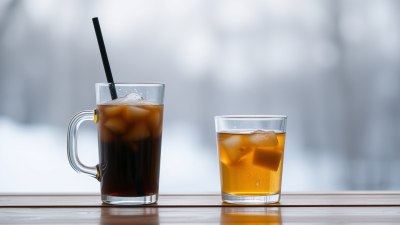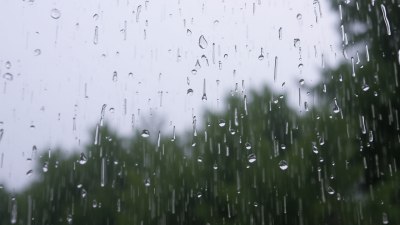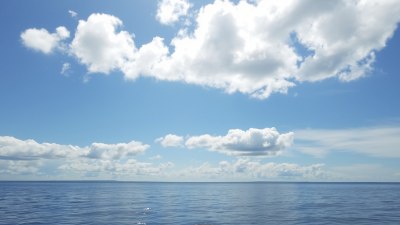Why You Regret Every Beverage Choice the Second the Forecast Changes
Explore why shifting weather forecasts make you regret your beverage choices, from hot coffee to iced drinks, and how to adapt your sipping habits.

Image created with Flux Schnell
Every day, millions of people make simple yet significant decisions that can set the tone for their mood, comfort, and overall enjoyment. Among these daily decisions is the choice of beverage. Whether it's a hot coffee in the morning or an iced tea in the afternoon, these liquid companions accompany us through our routines. Yet, there is a universal experience many can relate to: the sudden regret that comes with a change in the weather forecast. It's as if the clouds, the sun, or the wind conspire against our very personal preferences, turning a perfectly chosen drink into a source of disappointment.
Why does a shift in weather — often sudden — lead to such visceral regret over what we choose to drink? The answer lies in a combination of physiological responses, psychological expectations, and the inherent unpredictability of weather itself. This article will delve into the nuances behind this phenomenon and offer insight into how to make more adaptable beverage decisions that can weather the storms of changing forecasts.
The Emotional Weight of Beverage Temperature
The temperature of a beverage is more than just a matter of preference; it often reflects our internal emotional state and expectations for comfort. When the weather forecast predicts a cold front, reaching for a hot drink like coffee, tea, or hot chocolate feels almost instinctive. The warmth of the beverage offers a psychological and physical comfort, buffering us against the chill. Conversely, on a bright and sunny day, iced beverages can seem refreshing and invigorating, promising relief from heat.
However, the fickle nature of weather can quickly undermine these choices. Imagine stepping out with an iced latte on a morning forecast calling for 80 degrees and sunshine, only to be met with a sudden cold wind or an unexpected spike in humidity that makes the previously comforting cold drink oddly unsatisfying. Likewise, a steaming cup of coffee might soothe on a crisp fall morning but feel oppressively hot and heavy if temperatures unexpectedly soar.
This emotional weight is closely tied to the body's thermoregulation mechanisms. Humans instinctively seek to regulate their core temperature, and beverages play a surprisingly large role in this balance. A cold drink cools the body and can lower heart rate, often providing a sense of revitalization on warm days. Hot drinks increase body temperature and can promote relaxation, which is especially welcome in colder conditions. When the weather forecast changes abruptly, the mismatch between the drink temperature and environmental conditions triggers discomfort and regret.
How Weather Forecast Changes Influence Decision Regret
Decision regret is a psychological phenomenon where individuals feel remorse or disappointment over a choice made, often intensified by new information or changing circumstances. The dynamic and often unpredictable nature of weather forecasts is a perfect trigger for this. When a forecast shifts — say, from sunny to rainy, or from mild to hot — it can cast previous decisions in a negative light.
Our beverage choices are no exception. Because these choices are closely tied to anticipated comfort based on weather, any discrepancy between expectation and reality can lead to swift regret. For example, choosing an iced drink on a forecast predicting warm weather makes perfect sense; but if an afternoon thunderstorm rolls in, that cold drink suddenly feels inappropriate.
Psychological studies reveal that regret intensifies when decisions are made under uncertainty and when decisions are perceived to be reversible or avoidable. Weather forecasts are probabilistic and open to sudden change, producing ongoing uncertainty. Since beverages can be purchased and consumed immediately, the temporal proximity between decision and consequence heightens emotional responses.
The Role of Weather Forecast Accuracy and Uncertainty
Weather forecasting has improved dramatically over recent decades thanks to advances in meteorology, satellites, and computational models. Yet, inherent uncertainty remains, particularly with longer-term or highly variable forecasts. This uncertainty feeds directly into the regret cycle related to beverage choices.
When a forecast predicts a warm day but later revisions cut temperature expectations or predict unexpected precipitation, those who purchased cold drinks may feel their decision was poor. Similarly, forecasted cold days that suddenly warm, leaving someone with a hot beverage they find unpalatable, contribute to regret. Despite technological progress, the gap between forecast and actual weather conditions makes beverage planning tricky.
Interestingly, studies show that people often neglect uncertainty in weather forecasts, treating them as certain outcomes rather than probabilities. This cognitive bias means many make beverage decisions based on the forecasted high temperature or expected weather condition alone, without planning for variation. This can amplify regret when forecasts change.
Psychological Factors Behind Beverage Regret
Beyond physiological and environmental elements, psychological factors play a crucial role. One such factor is the sunk cost fallacy; once a beverage has been purchased or prepared, people may feel compelled to consume it even if conditions change, which can deepen regret if the drink feels out of place.
Social influences compounds this. For example, a person might choose a trendy iced coffee to fit in with peers during a warm day forecast, only to find the weather turning cool and their choice uncomfortable yet socially reinforced. This social pressure intensifies feelings of regret as individuals balance personal comfort with group conformity.
Additionally, individual differences such as mood, health conditions, or dietary preferences affect beverage satisfaction. For people sensitive to cold, an iced beverage in borderline cool weather will produce stronger regret if the forecast changes to chilly. Similarly, those with caffeine sensitivities may regret choosing a hot coffee on a warm day that unexpectedly intensifies.
How Cultural Norms Shape Beverage Preferences and Regret
Cultural expectations and rituals around beverages also influence the experience of regret. In many cultures, hot tea or coffee is strongly associated with comfort, hospitality, and routine, often imbued with symbolic meaning. When environmental conditions clash with these traditions—say, an unseasonally hot day during a winter festival—the clash creates internal conflict manifesting as regret over beverage choice.
Similarly, in warmer climates, iced beverages dominate social drinks, making sudden cold snaps feel jarring when holding a cold glass. This mismatch appears as regret but also highlights how cultural context shapes our attachment to particular beverage types depending on season and weather.
Technology and Apps Tailored to Beverage Choices and Weather
To combat beverage regret driven by weather changes, innovative tech solutions have started to emerge. Some smartphone apps now offer real-time beverage recommendations based on updated local weather forecasts, personal preferences, past choices, and even mood trackers. These tools help users decide between hot, cold, or neutral drinks dynamically throughout the day, adjusting as forecasts evolve.
For example, an app might suggest a hot chai latte in the morning with a forecast of cool rain but recommend iced lemonade if the afternoon warms unexpectedly. By integrating weather data with individual profiles, such apps minimize regret by pre-emptively adapting beverage choices.
This integration of technology and weather awareness can transform how people approach daily beverage rituals, emphasizing flexibility and responsiveness over fixed decisions. It also underscores an opportunity for beverage companies to tailor marketing and product development to shifting climate conditions.
Practical Tips to Avoid Beverage Regret When Forecasts Change
Despite the inherently unpredictable nature of weather, there are strategies to minimize regret and improve satisfaction with beverage choices:
- Check Multiple Forecast Sources: Consult several weather services to gauge consensus and reduce surprises.
- Opt for Versatile Beverages: Choose drinks with room-temperature tolerance, such as lightly chilled infused water or lukewarm teas, to remain comfortable across conditions.
- Layer Your Beverage Options: Carry a travel mug that can toggle between hot and cold settings or pack a beverage cooler to allow on-the-go adjustments.
- Monitor Real-Time Weather: Use weather apps with alerts to adjust plans or purchases throughout the day.
- Practice Mindful Drinking: Accept minor discomfort as part of natural variation and savor the drink without fixed expectations.
- Embrace Flexibility: Consider delaying beverage purchase until closer to consumption time when forecasts are more stable.
By incorporating these practices, individuals can reduce the emotional and practical toll of regreting beverage choices when the skies play tricks.
The Science Behind Beverage Temperature and Hydration
Beyond subjective feelings, there is biochemical and physiological science driving how we perceive beverages under varying conditions. Studies indicate that cold beverages tend to promote faster hydration absorption, helping to quickly regulate core temperature during heat. Conversely, warm beverages can promote sweat production and circulation, aiding cooling during milder cold weather.
Therefore, selecting a beverage appropriate to current or expected weather aligns with our body's biological needs. When forecasts change and beverage temperature mismatches conditions, the body reacts more strongly, leading to physical discomfort that translates to regret.
Adaptive Behavior in Response to Changing Weather
Humans have evolved adaptive behaviors to cope with environmental fluctuations. Beverage choice is one small but meaningful extension of this adaptability. Regretting a misaligned beverage choice is part of an ongoing feedback loop where we learn from experience and update future decisions.
Seasoned weather-watchers and beverage enthusiasts might keep multiple favorite drinks on hand or develop intuition in reading cloud patterns and wind chill beyond forecasts. Technology and cultural knowledge combine to enhance resilience against sudden climatic shifts. Over time, this reduces the shock of unexpected changes and their impact on beverage satisfaction.
Impact of Climate Change on Beverage Regret
As climate change ushers in more volatile and extreme weather patterns, the frequency and intensity of weather-triggered beverage regret could increase. Unpredictable temperature swings, shifting seasonal timelines, and unseasonal storms all complicate planning.
This new reality beckons innovation in beverage products designed for flexibility, packaging that maintains temperature longer, and smarter forecast technologies tailored to consumer needs. It also calls for increased awareness among consumers about weather variability and coping techniques to manage expectations.
The Marketing Side: How Brands Respond to Weather-Induced Regret
Recognizing the emotional ties consumers have to beverage temperature and weather comfort, many brands now tailor their marketing with weather-related campaigns. Promotions for hot seasonal drinks arise just as cold fronts approach, while iced beverage offers dominate heatwaves. Some chains use real-time weather data to flash deals for appropriate drinks via mobile notifications.
Furthermore, brands experiment with hybrid beverages—warm but served cold, or icy drinks with warming spices—to bridge the gap and reduce the risk of consumer regret. These innovations not only reflect consumer psychology but actively shape preferences by providing options compatible with uncertain weather.
How Personal Preferences and Habits Influence Regret
Personality traits and habitual consumption patterns mediate the intensity of beverage regret with shifting weather. For instance, people with high sensitivity to temperature changes or those with strong routines centered on specific drinks (such as morning espresso) may experience stronger regret when disrupted.
Conversely, those with a more experimental palate or adaptable habits tend to adjust more easily, mitigating regret. This suggests that fostering flexible drinking habits can be a personal strategy for comfort, alongside external factors like weather and cultural norms.
In sum, regretting every beverage choice as the forecast changes stems from a complex interplay of physiological needs, psychological expectations, environmental unpredictability, cultural context, and personal habits. Understanding these forces can help individuals approach their daily drink choices with greater awareness and adaptability.
Armed with knowledge about how and why weather shifts impact our beverage satisfaction, along with practical tips and openness to change, it is possible to enjoy our drinks with less regret and more comfort—no matter what the forecast brings.











